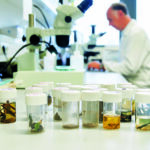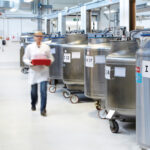Studying the Future
The water industry needs experts worldwide. Our university trains them. An example. By Katrin Koster
Water is a fascinating element. Unfortunately, there is less and less of it – at least less clean water that is safe to drink. Experts like Hasan Idrees and Hussein Abuelgasim are therefore in great demand. They have acquired valuable specialist knowledge In the master’s degree programme Management and Technology of Water and Waste Water, or MTW3 for short. The aim is to contribute to securing the water supply of the future.
They began the master’s programme at the UDE in 2015, with the support of a scholarship. Now the two 30-year-olds are working enthusiastically towards their doctorates at the Chair for Mechanical Process Engineering/Water Technology.
Many countries lack sufficient groundwater but often have saline surface water. Abuelgasim is investigating how this water can be made into drinking water for his doctoral dissertation. Nanofiltration membranes help in the desalination process. ‘Chemicals that are harmful to the environment are often used to clean them. I want to make the filters better,’ explains Abuelgasim. His idea: optimising the operating conditions and using hydraulic rinsing methods.
Idrees, on the other hand, is studying ultrafiltration membranes, which help to purify oily wastewater. ‘When a barrel of oil is produced, nine barrels of dirty, oily water are produced at the same time,’ says Idrees. ‘I would like to optimise the membranes for purifying this water to make them more durable and effective, thereby also reducing the strain on the environment.’
Seven years ago, the two could hardly have foreseen that they would take these paths. What attracted them to the international degree programme initially was the diversity: Young people from across the globe learn the fundamentals of engineering, water management and water treatment here, combined with a business management angle. Hussein Abuelgasim came to the Ruhr region from Sudan with a bachelor’s degree in chemistry; Hasan Idrees studied civil engineering and environmental technology in Homs in Syria.
»Chemicals that are harmful to the environment are often used to clean the nanofiltration membranes. I want to make the filters better.«
‘It was clear to us that it would not be an easy programme, but all of the disciplines at the UDE work closely together, and four of the five courses in the first semester are in English – so you can get into the subject really well,’ says Idrees encouragingly. The students’ language skills improve with each passing semester, allowing them to take more and more courses in German. He himself has shown that one can deliver outstanding academic achievements after just one year of language training – and he received an award for it on his graduation in 2016.
The lecturers at MTW3 are also highly dedicated, adds Abuelgasim: ‘Institute director Professor Stefan Panglisch and the chief academic officer Dr. Ralph Hobby are particularly supportive. We can go to them with any question at all, even ones about the procedures at the German authorities.’
Seven study programmes
The interdisciplinary course offerings at the UDE are unique in Germany: A total of seven study programmes bear a relation to water. They cover all relevant areas of the topic and belong to the Faculties of Engineering, Chemistry or Biology. Further practical experience is offered by two affiliated institutes, the IWW WaterCentre and the Institute of Energy and Environmental Technology IUTA. In addition, the Centre for Environmental and Water Research (ZWU) has been working since 2003 to pool expertise both across the UDE faculties and across universities in the Ruhr metropolitan region.
Student group provides support
The students also help one another: ‘We founded the AquaSmar-Tech Group as an additional connecting link between teachers, students, and the professional world,’ Idrees explains. Tips for first-year students, visits to conferences, excursions and barbecues are just as much a part of it as inspiration for work placements and master’s theses or contact with other student groups. AquaSmar- Tech even has its own app, which provides news from the water and sewerage sector, for example.
Each semester, around 20 students, approximately 35 percent of them women, begin MTW3, which is part of the University’s ISE (International Studies in Engineering) programme. They quite literally immerse themselves in the subject, taking examinations, writing research papers, conducting experiments in the lab, and holding presentations. All students introduce their classmates to water management in their native country. In this way, they learn how to hold presentations in both German and English – while at the same time giving each other insight into global structures. ‘Some things appear later as questions on the exams,’ remarks Abuelgasim, illustrating how interconnected the content is. Incidentally, German students must spend three to six months abroad to gain international experience as well.
Future prospects to the third power
Graduates of the master’s programme find positions in areas like plant desgin and engineering, water supply and waste water disposal, and at planning and consulting companies. Water boards, governmental organisations, ministries and administrative bodies, NGOs and research institutes also appreciate the expertise of our international graduates. ‘We still have to write applications, sometimes quite a few, because some personnel departments don’t even know what category to put our degree under yet,’ explains Abuelgasim.
What do they plan to do after completing the doctorate? ‘I’m drawn to work at an engineering firm,’ says Idrees. ‘I’d like to get my hands dirty there and can imagine working directly in developing countries.’ Abuelgasim is interested in research and teaching: ‘I would like to deepen my knowledge of desalination processes – and pass it on to others.’ After all, the water management of the future can only succeed through collaboration across disciplinary boundaries.



